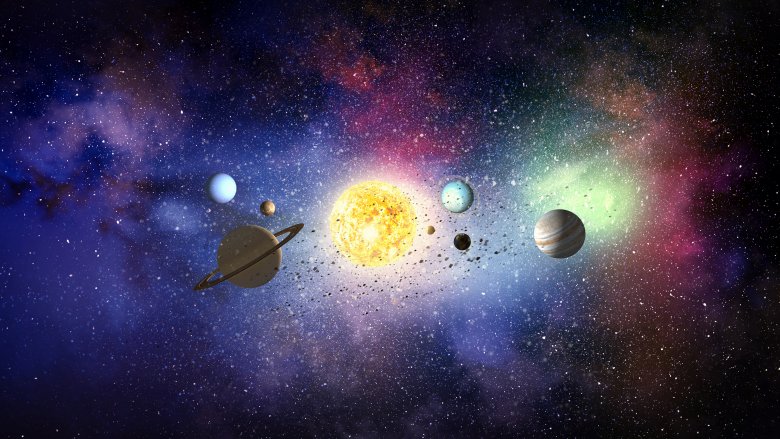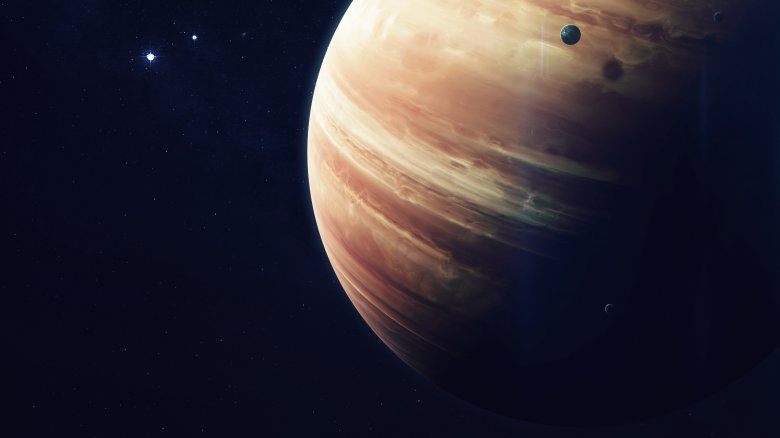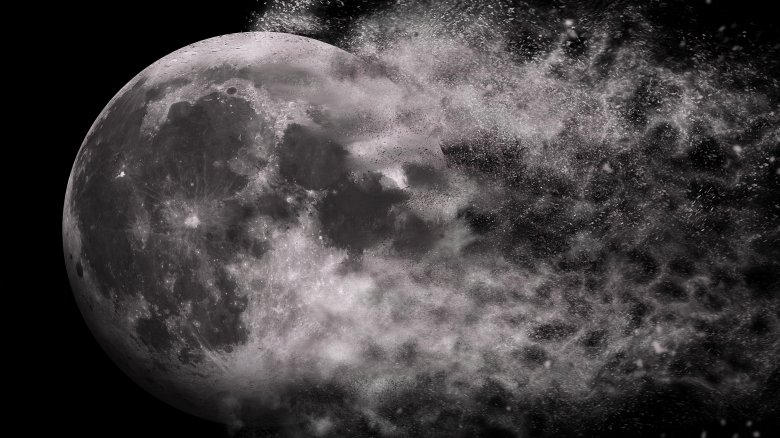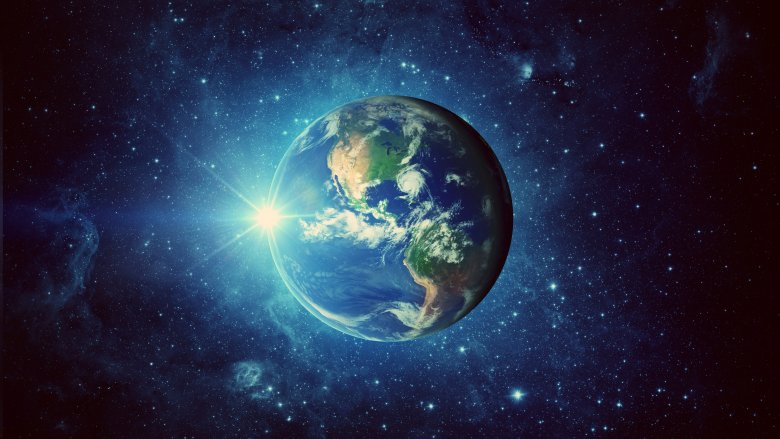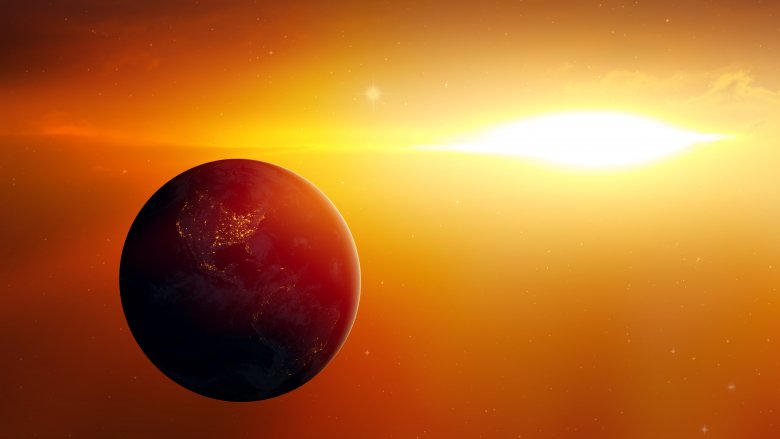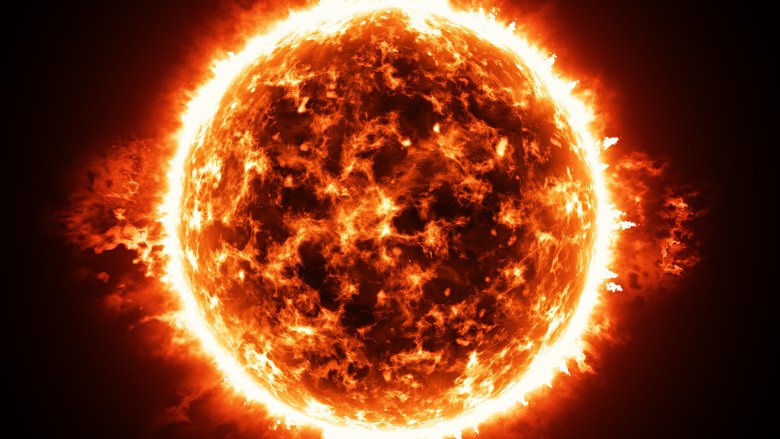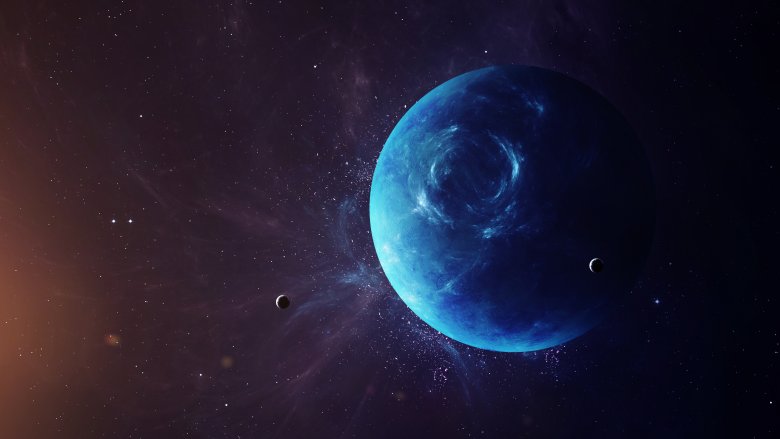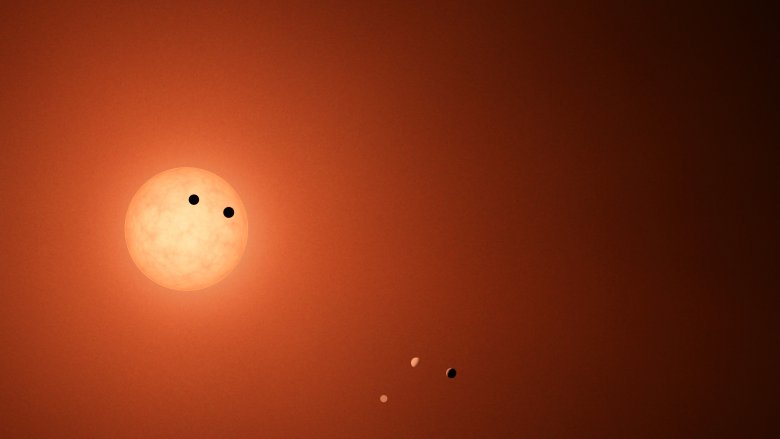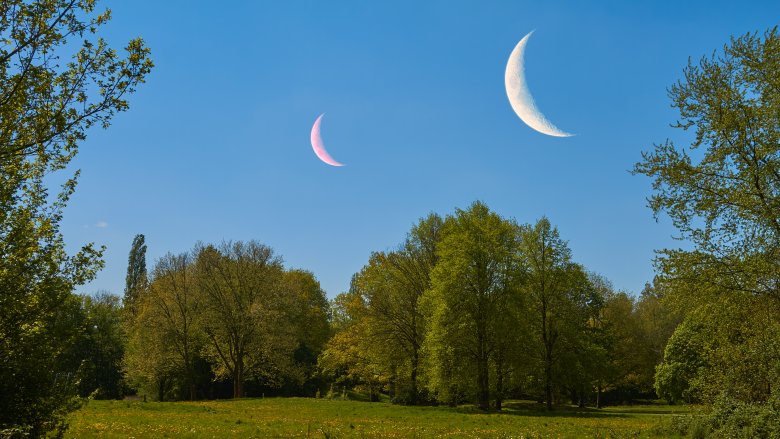Changes In Our Solar System That Would Doom Us All
Our solar system is pretty sweet. It supports life on Earth and is relatively safe — at least, it is for now. These little tweaks would utterly doom life on Earth.
If Jupiter wasn't there
Jupiter isn't just a cool planet with tons of moons around it. Astronomers theorize that our big gassy neighbor is protecting Earth from all the rocks and ice balls floating around in space. If Jupiter disappeared for some reason, whether by natural effects (planets don't last forever) or from something catastrophic like a rogue planet collision, it would doom all life on Earth.
To see why, imagine that Jupiter is a big space vacuum cleaner. Its large gravitational field sucks in a ton of dangerous debris coming from the belts of comets surrounding our solar system, keeping them from going into the inner system. Jupiter is big enough to keep the inner solar system clear of catastrophically big space rocks, like Shoemaker-Levy 9, which was so big it tore a hole in Jupiter's atmosphere.
Although Jupiter does fling many more small pieces of debris at Earth, it deflects or absorbs a lot of the bigger asteroids and comets. Without Jupiter, Earth would be bombarded by much larger asteroids and comets. Even one asteroid impact on Earth could absolutely wreck life. Imagine that happening over and over and over again. Even a mining crew led by Bruce Willis wouldn't be able to save us.
If the Moon exploded
What if the Moon got hit by a rogue planet traveling through our solar system or got nuked during a future space war? All those chunks of the Moon would enter orbit. They wouldn't just stay in one place, though, creating a beautiful ring around the Earth like Saturn. The debris would kill us.
Science fiction writer Neal Stephenson explored the idea in his book Seveneves, but a Berkeley scientist ran a simulation to figure out exactly what would happen in the real world. He concluded that the Moon pieces would start colliding with each other almost instantly, smashing themselves into smaller and smaller pieces. This is a runaway reaction called the Kessler syndrome, where pieces of space debris smash themselves into a whole cloud of deadly pieces zipping around the Earth, like we saw in the movie Gravity.
Earth would be surrounded by moon chunks before long, and it would be impossible to travel safely in space without getting smashed to pieces by the deadly rocks. And we'd definitely want to leave the planet. Eventually the Earth would pull all the debris inward, blowing the hell out of the surface and ending all present life in a blaze of fire. Little did we know, our beautiful moon is just a time bomb waiting to annihilate us all.
If the Earth stopped spinning
If the Earth stopped spinning, it wouldn't just make days and nights really weird. Actually, we probably wouldn't be around long enough to complain about a messed-up schedule. Before that even happened, we would die by a menagerie of horrifying things.
Let's look at what the oceans would do. Right now, the oceans are in their place due to the centrifugal force caused by our angular momentum and our planet's gravity. Without the spinning, the oceans would migrate to where gravity pulls them: the poles. Just try to picture the oceans themselves moving out to the poles, washing over all the existing land. It would be a flood worse than the Noah story. The equatorial regions of the planet would get uncovered, but everybody else would drown long before they got to use them. (Sorry, all of Canada.)
Not only that, but our atmosphere would keep moving just as it was, at least for a little while. Because most of us wouldn't survive the 1,000 mph supersonic winds that would rip apart life on Earth as the whole atmosphere kept on going, with the air eventually settling down a little more densely at the poles than at the equator. Oh, and the Moon would probably crash into the Earth after all that. No matter how we cut it, if the Earth stops spinning, we're screwed.
If the Sun had a major solar storm
The Sun has storms just like Earth ... well maybe not exactly like Earth's. Solar storms aren't clouds and rain, they're eruptions of radiation, plasma, and high-speed particles. A big enough one would absolutely annihilate modern life on Earth.
Pretty much everything we rely on in modern society is dependent on electronics, and our tech would take the biggest beating. If the storm was caused by a coronal mass ejection (basically a big chunk of the Sun's outer plasma layers getting blown off and colliding with Earth), the power grid would overload and fail. No more electricity. The storm would also cause an electromagnetic pulse that would fry out electronics, mostly our satellites.
What's really scary about solar storms is that they aren't uncommon, and they have messed up society before. In 1859 a massive solar storm hit Earth, frying telegraph lines and creating such strong auroras that some people could read newsprint by aurora light. Since things weren't super technological back then, it didn't take long to rebuild. If a similar event happened today, one big problem would be the destruction of our satellites. Try to imagine modern life without satellites. We could launch more eventually, but we'd need to rebuild our electric grid first. Maybe we'd be better off preparing by watching Mad Max: Fury Road.
If a supernova star exploded too close to us
Not all stars go supernova. Our sun, for example, isn't big enough to go supernova. But many other stars in the galaxy are big enough, and supernovas close enough to Earth would cause huge problems.
The biggest danger of a supernova isn't the explosion; it's the radiation that comes from the supernova. When stars explode, they shoot out lots of gamma rays, a highly energetic form of radiation found at the extreme end of the electromagnetic spectrum. If a big burst of gamma rays slammed into Earth, the rays would strip away the ozone layer that protects us from solar radiation. So the gamma ray burst wouldn't kill us instantly, but without the ozone layer we'd be fried by radiation from the Sun, causing a mass extinction all over the planet. It's a stellar one-two punch.
Should we be worried about a supernova? Maybe. The closest known star that could blow up with enough energy isn't close enough to cause problem: it's 150 light-years away. However, a Type 1 supernova, which happens when a white dwarf star blows up, could sneak up on us because white dwarfs are hard to detect. There could be some sitting really close to our solar system that haven't been identified. It's unlikely, but not impossible. There could be a star waiting to destroy life on Earth nearby ... a Death Star, if you will.
If the Sun was 4 billion years older
The Sun isn't going to last forever. If it was just four billion years older, it would utterly doom life on Earth. Right now the Sun is in its main sequence (the prime of its life), burning hydrogen fuel like a champ and keeping life stable on Earth.
In four billion years, the Sun will start its death spiral, turning into a massive star as it burns through the heavier elements trying to keep up at least some energy. When this happens, the Sun will expand to a gigantic size. Mercury and Venus will definitely get swallowed up, and Earth probably will as well. Can't sugarcoat that one.
Even if the Sun doesn't swallow us up, a giant sun will certainly make life on Earth impossible. Our planet would be roasted by having the solar surface so much closer to us. If somehow we adapted to being so close to a red giant, we would still have to deal with the Sun expelling most of its mass and then turning into a comparatively cold dwarf star. Adapting to the heat would only set the stage for us to freeze to death. Cozy.
If there were no gas giants
The gas giants aren't just really pretty planets — they actually made life happen on Earth. To understand why, we've got to rewind billions of years to the late heavy bombardment. This was a period in Earth's history when it was absolutely pulverized by asteroids. The general assumption was that getting smashed by space rocks sterilized the Earth's surface and made life impossible for billions of years.
And that's a reasonable conclusion, but recent studies actually have shown that those asteroids might have created the perfect conditions for subterranean microbes on Earth to survive for millions of years and eventually start life on our planet. Turns out the late heavy bombardment gave Earth a chance for life. And how do the gas giants play into this? During the early universe the orbits of the planets weren't locked in yet, and Neptune "wandered" around the solar system toward gravitational sweet spots. As the gas giants migrated, they disturbed all the leftover material from the birth of the solar system that was just floating around in the solar suburbs. The gas giants sent all that garbage toward the Sun and the inner planets, seeding Earth with microbes. Without those gas giants, Earth life might never exist. One thing led to another, and now we have cat video festivals. Rock on, Earth.
If a rogue planet wandered into our solar system
It sounds like something straight out of Star Trek, but there are rogue planets out there, beholden to no star. And there are a lot of them. In fact, there might be more rogue planets than orbiting planets like ours. These planets just wander around the galaxy. There are so many of them floating around that one might be close by, completely unbeknownst to us.
So what would happen if one entered our solar system and got all up in our business? Literally nothing good. Sure, it would look really pretty, like in the movie Melancholia, but we would soon curse this rogue intruder. If it came close to Earth at all, the wanderer would disturb our orbit, sending us into a more elliptical orbit. While that doesn't sound scary, it would really screw up the seasons, creating absurdly hot summers and long, deadly cold winters. Our modern society might be able to adapt, but it's unlikely, especially since all the plant life we rely on would die. And if Game of Thrones is any indication, the political ramifications alone would be really, really awful.
Space is ridiculously big, so the chance of a rogue planet coming close enough to mess up our orbit is closer to not-technically-impossible than anything else. Obnoxiously minuscule possibility here. But hey, this is a thought experiment. Loosen up, buddy!
If we got another moon
Our moon is pretty unique in the solar system, partly because of how big it is in comparison to Earth and partly because it's a singleton. All the other planets that have moons have a whole bunch of them, but for some reason the Earth only got one. It's probably a good thing, since another moon would wreck us.
Let's pretend the Earth captured a Moon-sized rogue planet that was wandering through our solar system. Life as we know it would get really messed up. Tides would no longer be small adjustments: they'd be thousands of feet different, meaning the end of our current coastal cities. Our night skies would mostly get brighter, but the two-moon system would also force us to totally rethink our (Moon-based) calendar system.
Now, these considerations are assuming that we survive the second moon showing up in the first place. The gravitational effects on the Earth as the new moon started to orbit would probably wipe out most life on Earth. Giant tsunamis, tectonic upheavals, and volcanoes would ravage the surface. Anybody who survived the onslaught would find that there were very few places to live on Earth anymore. But at least the night skies would look cool until the two moons inevitably crashed into each other and bombarded Earth with deadly garbage, likely vaporizing all life. But that's just the price we pay for beautiful skies.
